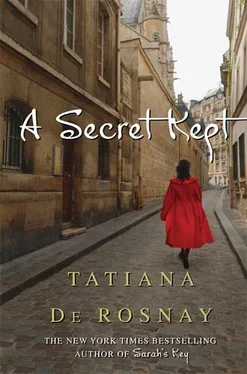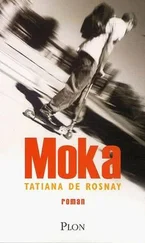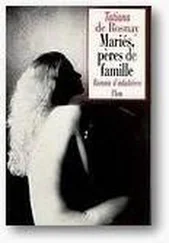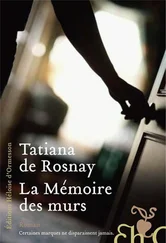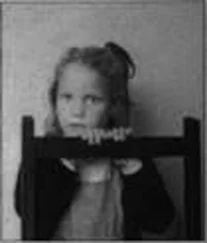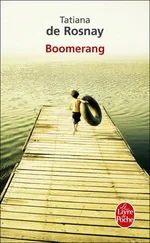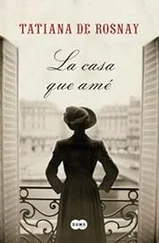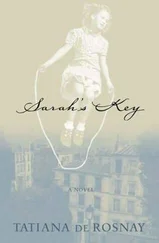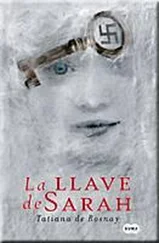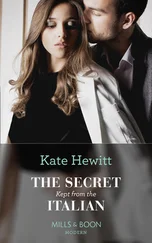“And how did you get through those three hours thanks to this amazingly attractive girl, may I ask?”
“By reading Victorian poetry.”
“Sure.”
She laughs, that low, sexy, throaty laugh I love so much, and I grab her, press her to me, kiss her avidly. I fuck her as if there is no tomorrow. The fragrant rose petals get mixed up in her hair and in my mouth and taste bittersweet. I feel like I cannot get enough of her, as if this is our last time. I am frantic with lust. I yearn to tell her I love her, but no words pass my mouth, only sighs, moans, and groans.
“You know, you should spend more time on trains,” she mutters dizzily as we lie on the crumpled linen sheets, spent.
“And I feel sorry for all those dead people you fiddle with. They have no idea what a good lay you are.”
It is later, much later, after we have showered, after a late-night snack of cheese, Poilâne bread, a few glasses of Bordeaux, and a couple of cigarettes, and after we have installed ourselves in the living room, with Angèle comfortably laid out on the couch, that she finally says, “Tell me. Tell me all about June and Clarisse.”
I take the medical file, the photographs, the letters, the detective report, and the DVD out of my bag. She watches me, glass in hand.
“I don’t know where to begin,” I say slowly, feeling confused.
“Imagine you are telling a story. Imagine I know nothing, nothing whatsoever. I have never met you, and you have to explain it all, very carefully, with all the right details. A story. Once upon a time…”
I reach out and take one of her Marlboros. I don’t light it, I just keep it between my fingers. I stand up, facing the old fireplace, with its dying blaze, embers gleaming red through the darkness. I like this room too, its size, its beams, its walls lined with books, the antique square wooden table, the quiet garden beyond that I cannot see, for the shutters are closed for the night.
“Once upon a time, in the summer of 1972, a married woman goes to Noirmoutier island with her parents-in-law and her two children. She is on holiday for two weeks, and her husband will join her on weekends if he’s not too busy. She is called Clarisse, she is lovely and sweet, and not a sophisticated Parisienne…”
I pause. It feels strange talking about my mother in the third person.
“Go on,” urges Angèle. “That’s fine.”
“Clarisse comes from the Cévennes, and her parents were simple, rural people. But she married into a wealthy, well-to-do Parisian family. Her husband is a young maverick lawyer, François Rey, well known for the Vallombreux trial in the early seventies.”
My voice wavers. Angèle is right, it is a story. My mother’s story. And I have never told it to anyone. After a pause, I go on.
“At the Hotel Saint-Pierre, Clarisse meets an American woman called June, who is older than she. How do they meet? Perhaps coming down for drinks one evening. Perhaps on the beach one afternoon. Maybe at breakfast, at lunch, at dinner. June has an art gallery in New York. She is a lesbian. Was she there with a girlfriend? Was she alone? All we know is-Clarisse and June fall in love that summer. This is not… just an affair, a summer fling… This is not just sex. This is love. A hurricane-like, unexpected, twister of a love… Real love-the kind that comes once in a lifetime-”
“Light that cigarette,” orders Angèle. “It will help.”
I comply. I inhale deeply. She’s right. It does help.
“Of course, nobody must know,” I continue. “There is too much at stake. June and Clarisse see each other when they can during the rest of 1972 and the beginning of 1973, which is not very often, because June lives in New York. But she comes to Paris for business every month or so, and that’s how they meet, at June’s hotel. And then, during the summer of 1973, they plan to spend time together again, at Noirmoutier. And things aren’t as easy, as simple, that summer for June and Clarisse. Even if Clarisse’s husband is not often there, because he works and travels, one day the mother-in-law, Blanche, has a horrible, niggling suspicion. She knows. And that day she makes up her mind.”
“What do you mean?” says Angèle, alarmed.
I don’t answer. I continue my story, concentrating, taking my time.
“How does Blanche know? What does she see? Is it a fleeting glance of longing that lasted a trifle too long? A tender hand caressing a bare arm? Is it a forbidden kiss? Is it a silhouette she spied in the night, flitting from one room to another? Whatever Blanche saw, whatever it was, she kept it to herself. She did not tell her husband. She did not tell her son. Why? Because the shame was too great. The horror and the shame of her daughter-in-law, now a Rey, now a mother, having an affair-and to crown it all, an affair with a woman. The Rey family name could not be soiled. Not over her dead body. She had worked too hard for this. She had not been brought into the world for this. She, a Fromet from Passy, married to a Rey from Chaillot-no, it was unthinkable. It was monstrous. It had to be ended. Fast.”
Oddly enough, I am very calm as I tell the story, my mother’s story. I do not look at Angèle’s face, because I know it must be stricken. I know what my words sound like to her, their reach, their potency. I have never uttered this story, never pronounced that precise sequence of sentences, never said what I am now saying, and each word coming out is like a birth, the shock of cold air on a fragile, naked body slithering out of the womb.
“Blanche confronts Clarisse in Noirmoutier, at the hotel. Clarisse cries, she is upset. There is a scene in Blanche’s room on the first floor. Blanche warns her. She is frightening, ominous. Blanche threatens her, says she will reveal the affair to her husband, her son. She says she will take the children away from her. Clarisse sobs, yes, yes, of course, she will never see June again. But she cannot. It is beyond her control. She sees June again and again, and she tells her all this, but June laughs it off. She is not afraid of a snob of an old lady. The day June leaves for Paris to fly back to New York, Clarisse slips a love letter under June’s door. But June never gets it. It is intercepted by Blanche. And that’s when the trouble truly begins.”
Angèle gets up to stir the embers of the fire, as the room is getting cold. It is late now-how late, I don’t know. I am aware of a leadlike weariness weighing on my eyelids. But I know I need to go to the very end of the story, the part I am dreading, the part I don’t want to have to say out loud.
“Blanche is aware that Clarisse and June are still lovers. In the letter she stole, she learns that Clarisse dreams of a future with June and the children. Somehow, somewhere. She reads this with loathing and revulsion. No, there is no future for June and Clarisse. No future is possible for them. Not in her world. And there is no way her grandchildren, Reys, will have anything to do with this. She goes to a private detective in Paris and explains that she wants her daughter-in-law followed. She pays a lot of money for this. Again, she never tells her family. Clarisse thinks she is safe. She is waiting for the day she and June will be free. She knows she has to leave her husband, she knows what this entails. She is afraid for her children, but in her mind, she is in love, and she believes love will find a way. Her children are the most precious beings to her, and so is June. She likes to imagine a place, a safe place, where she can live one day with June and the children. June is older, wiser. She knows. She knows that two women cannot live together like a couple and be treated normally. This may occur in New York, perhaps, but not in Paris. Not in 1973. Certainly not in the kind of society the Rey family live in. She tries to explain this to Clarisse. She says they need to wait, to take their time, that things can happen quietly, slowly, with less difficulty. But Clarisse is younger and more impatient. She doesn’t want to wait. She doesn’t want to take her time.”
Читать дальше
